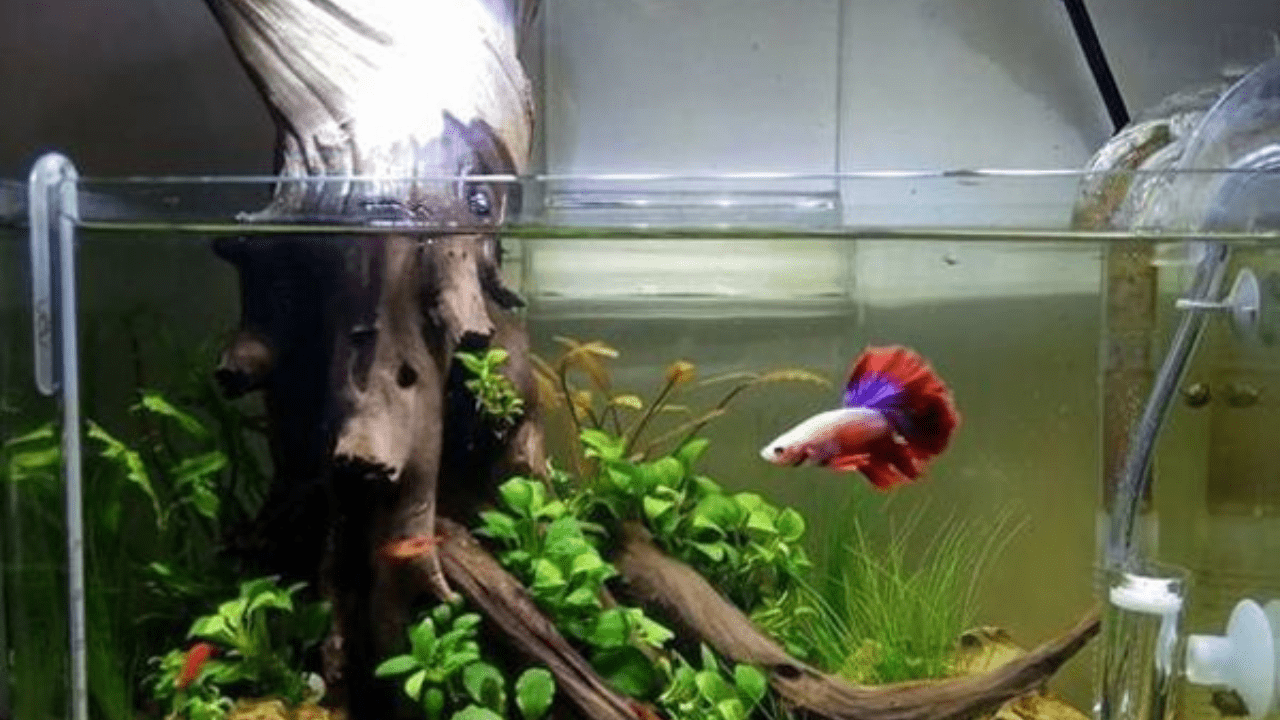Caring for Betta fish goes beyond just feeding and cleaning their tank—lighting plays a crucial role in their health too. While Betta fish don’t need intense lighting, providing the right amount helps them stay active and happy by supporting their natural day-night cycle.

In this article, we’ll dive into why proper lighting matters for your Betta, how to choose the best light for their tank, and what can happen if they don’t get enough (or get too much). Whether you’re new to Betta care or just looking to improve their setup, this guide will help you create the best environment for your fish to thrive.
Do Betta Fish Require Light in Their Aquarium?
Yes, Betta fish do need light, but their requirements are similar to most other animals. Betta fish thrive in a natural light environment with a consistent day and night cycle.
Extended periods of darkness can lead to lethargy in your Betta, which is why providing quality lighting is essential. Like most animals, light plays a vital role in the physical and mental health of bettas. Similar to other creatures, they anticipate nighttime, so it’s good to turn the lights off when you go to bed. A betta should receive approximately 14–16 hours of light daily to maintain a healthy routine.
Are Betta Fish Comfortable with Light?
Which Light Color Do Betta Fish Prefer?
Unlike humans, Betta fish do not have a strong preference for a specific color spectrum of light. However, a natural daylight spectrum between 4500K to 5500K is recommended as it closely mimics their natural habitat, promoting optimal health and well-being.
This range provides bright, clear illumination that resembles sunlight and enhances the vivid colors of your Betta. While they don’t prefer a specific color, it’s essential to avoid excessive light, as it can cause stress and lead to serious health consequences.
Should Betta Fish Have Light During the Night?
No, it’s not healthy to keep bettas in constant light. Like most animals, they need both light and darkness to stay physically and mentally well. While fish don’t truly sleep, they rest and conserve energy during the night, and they prefer a dark environment for this purpose.
What is the Importance of Light for Betta Fish?
Originating from the tropical rice paddies of northern Thailand, betta fish are accustomed to natural sunlight as part of their daily cycle. However, the artificial addition of too much or too little light can pose potential risks.
As a diurnal species, bettas thrive with consistent day and night cycles to stay healthy and happy. Fish naturally use the absence of light as a signal to rest, which you can simulate in your betta tank by turning off artificial lighting and allowing them to enjoy a dark tank at night.
Do Betta Fish Prefer Natural or Artificial Lighting?
While sunlight isn’t harmful to bettas and even provides UV light that benefits both fish and aquarium plants, direct sunlight on the aquarium is not ideal. It can heat up the tank’s temperature and promote algae growth, which can disrupt the environment.
Most aquarium lights are designed to mimic sunlight, offering nutritional benefits like Vitamin D without causing temperature fluctuations or algae overgrowth.
LED lights are an excellent choice for basic aquariums, and they work well with standard aquarium plants. Larger or professional setups might use UVB or other types of lighting, but for most betta tanks, LED lighting is sufficient.
Betta Fish in the Wild: Their Natural Habitat
In the wild, bettas often face extreme environmental changes, from monsoons to dry seasons, where they must survive in shallow standing waters. To cope with these challenges, they have developed remarkable adaptations.
One of the most fascinating is their ability to breathe air through a specialized organ called the labyrinth, placing them in the suborder anabantoidei. While hopping between shallow bodies of water can be dangerous, wild bettas can survive for up to 5–6 hours on dry surfaces as long as they have had adequate exposure to water beforehand.
The Impact of Excessive Light
Excessive light can be extremely harmful to your betta fish. The primary concerns are overstimulation and stress, both of which can result in serious health and behavioral complications. So in order to know how many hours of light does a betta need? check out the following video:
Additionally, too much light can promote harmful algae growth, which can disrupt the balance of the tank and negatively affect your betta’s environment.
Overstimulation
Excessive artificial or natural light in your fish tank can make it difficult for bettas to determine when to rest, be active, or eat. This inconsistency can lead to overactivity and stress as they struggle to adjust.Over time, constant stimulation can exhaust your fish, particularly male bettas, which may exhibit increasing aggression towards other fish or even themselves. In some cases, they may charge at their own reflection out of frustration.
Signs of Overstimulation
If your betta is frequently engaging with its own reflection, it may be a sign of overstimulation. In such cases, consider adding an aquarium paper background to block the reflection and reduce stress.
Other signs of overstimulation include lethargy, slow movement, or unusual behaviors such as swimming towards the top of the tank. These behaviors often indicate that your betta is receiving too much light and struggling to cope.
Stress
Stress is a natural response to environmental hazards or inconsistencies, but in fish, it can lead to a wide range of health problems and even death if not addressed in time. For instance, if your betta is not moving, the cause may be stress.
One of the most harmful effects of stress caused by aquarium lights is a loss of appetite. An overstressed fish may be too preoccupied with its environment to eat properly, potentially leading to starvation.
Additionally, a stressed fish becomes more vulnerable to illnesses and bacterial infections like fin rot. This condition can cause tiny holes to form in the fins, resulting in loss of function over time.
Effects of Too Much Darkness
While too much light can be harmful, excessive darkness can also cause issues for your betta fish. They may become lethargic, sleeping more than necessary, and may have trouble eating or stop eating altogether, as they typically feed during the day.
Although there is no exact minimum light requirement, bettas should follow a natural sleep cycle with about 8–10 hours of darkness each night. This mimics the amount of sleep a wild betta would get while remaining practical for aquarium owners to manage without needing a timer.
Choosing the Right Light
We recommend using artificial light over natural sunlight for your betta tank. Direct exposure to sunlight can cause overheating, as bettas often cannot avoid it.
When selecting an artificial light, look for options with an internal timer, which simplifies maintaining a consistent day-night cycle. Fluorescent lighting and other tank lights work well, but ensure they do not produce excess heat that could disrupt your betta’s environment.
For lights without built-in timers, consider modifying them with a plug-in socket timer, offering an affordable and practical way to enhance your aquarium light setup.
Best Light Options for Your Betta
When selecting a light for your Betta fish, it’s essential to choose one that provides the right amount of illumination, mimicking natural light to keep your Betta relaxed and healthy. Here are some options available on the market:
- LED Lights: Known for being energy-efficient, producing minimal heat, and often programmable. Examples include the Aqueon Clip-On LED Light and Fluval Plant 3.0 LED Planted Aquarium Lighting.
- Metal Halide Lights: High-intensity lights best for larger aquariums and reef tanks but generate a lot of heat. An example is the Phoenix Electric Company Metal Halide HQI.
- Fluorescent Strip Lights: Affordable and easy to install, suitable for small aquariums, but consume more power than LED. Check options like Aqueon Fluorescent Strip Light.
- T5 Fluorescent Lights: Slim, energy–efficient, and produce less heat than metal halides. Ideal for larger freshwater aquariums and reef tanks, with products like the Fluval T5 Double Lamp Aquarium Light.
FAQs
How Much Light Do Betta Fish Need?
Betta fish need a balanced day and night cycle, similar to their natural habitat in rice paddies. Avoid placing their aquarium in direct sunlight, as it can overheat the water and strain their body processes. For aquarium lights, wattage can range from 100-400W for high-powered setups.
How Many Hours of Light Do Betta Fish Need?
When planning aquarium lighting, mimic the natural light cycles of Southeast Asia, where bettas originate. Tropical regions typically have 10–15 hours of sunlight daily, with the remainder as dusk or darkness. Aim to keep your betta tank light on for 8–10 hours, providing a consistent day-night pattern to make them feel at home.
Should I Turn Off My Bettas Light at Night?
Absolutely! Turning off your betta fish light in the evening helps simulate a natural day-night cycle, promoting a healthy sleep routine and overall well-being.
Does My Betta Fish Need Sunlight?
Excessive sunlight exposure can stress Bettas since their natural habitats in stagnant or slow-moving waters receive limited sunlight. However, they thrive with a regular day/night cycle and low to moderate light levels.
Are LED Lights OK for Betta Fish?
LED bulbs are a great choice for aquarium lighting, offering an inexpensive alternative to fluorescent or incandescent bulbs. They use less power and don’t transfer additional heat into the water. Even colored lights like blue, yellow, or green can work well, adding a decorative touch to your tank. Just remember that all fish need light to navigate and make the best use of their environment.
Conclusion
Hopefully, this article has answered the question, “Do betta fish need light?”
Our general recommendation is to provide consistent lighting that maintains a balanced day and night cycle, closely mimicking their natural environment. This approach ensures your Betta fish can live their happiest and healthiest life in your care.
